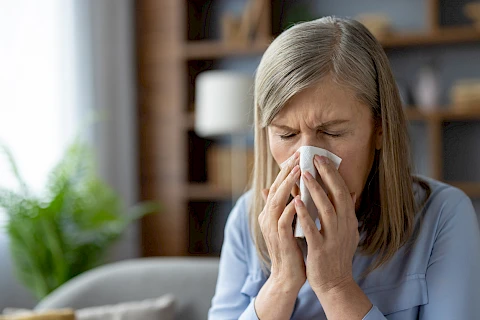
Seasonal allergies can impact anyone, but seniors often face greater challenges when dealing with them. As individuals age, changes in the immune system can make managing allergies increasingly difficult. For seniors, the discomfort of seasonal allergies can escalate into more serious health issues. Learn how to help seniors effectively manage their allergies, particularly during the fall months, ensuring they remain healthy and comfortable.
Common Allergy Symptoms in Seniors
Seasonal allergies manifest in various ways. Sneezing and runny noses are the most common symptoms. Seniors might find themselves sneezing more often or needing to blow their nose frequently.
Allergies can make the eyes feel itchy or watery. This can be particularly bothersome and may temporarily affect vision. Many seniors experience a stuffy nose and sinus pressure, which can be uncomfortable and may lead to headaches.
Allergens can irritate the throat and lungs, leading to coughing and wheezing, especially in seniors with preexisting respiratory issues. Finally, allergies can also sap energy, leaving seniors feeling tired and generally unwell.
Strategies for Minimizing Allergen Exposure
Reducing exposure to allergens can significantly help in managing symptoms. Pollen levels can be high during certain times of the day, especially in the morning. Keeping windows closed can prevent pollen from entering the home.
Air purifiers can help remove allergens from the air. Additionally, using high-quality HVAC filters can trap pollen and other particles. Dust and pollen can settle on surfaces. Regular cleaning helps keep the home allergen-free.
Pollen can stick to clothing and bedding. Washing these items often can reduce allergen buildup. If possible, try to schedule outdoor activities for times when pollen levels are lower, such as late afternoon or after a rain.
Tips for Working With Healthcare Providers
Regular visits to the doctor can help monitor and manage allergy symptoms before they become severe. Talk to the healthcare provider about any allergy symptoms the senior is experiencing. Identifying triggers can help in avoiding them.
There are various medications available to treat allergies. A healthcare provider can recommend the best options based on the senior's health condition. Consider allergy tests as well. Allergy tests can help identify specific allergens causing symptoms. This can be useful in developing a targeted management plan.
Work with the healthcare provider to create a plan tailored to the senior's needs. This might include medications, lifestyle changes, and other strategies to manage symptoms effectively.
Need Assistance With Allergy Management?
Managing seasonal allergies in seniors is important for their overall well-being. By recognizing common allergy symptoms, minimizing exposure to allergens, and working closely with healthcare providers, you can help seniors stay comfortable and healthy during allergy season. Don't hesitate to implement these strategies and make a positive difference in a senior's life.
If you need professional assistance in managing seniors' seasonal allergies or with any other aspect of senior care, contact us at Senior Helpers North Las Vegas. We are here to help seniors in North Las Vegas, Aliante, Las Vegas, and Nellis Air Force Base live their best lives, free from the discomfort of seasonal allergies.